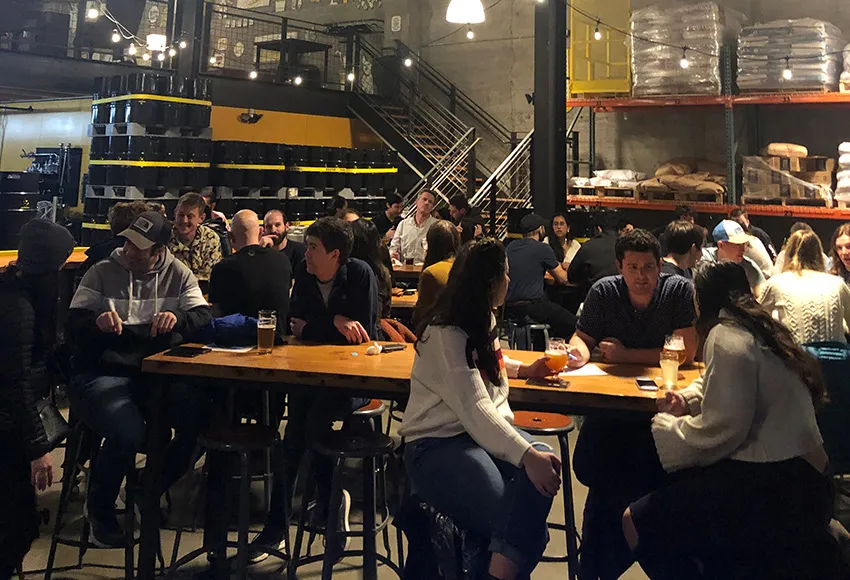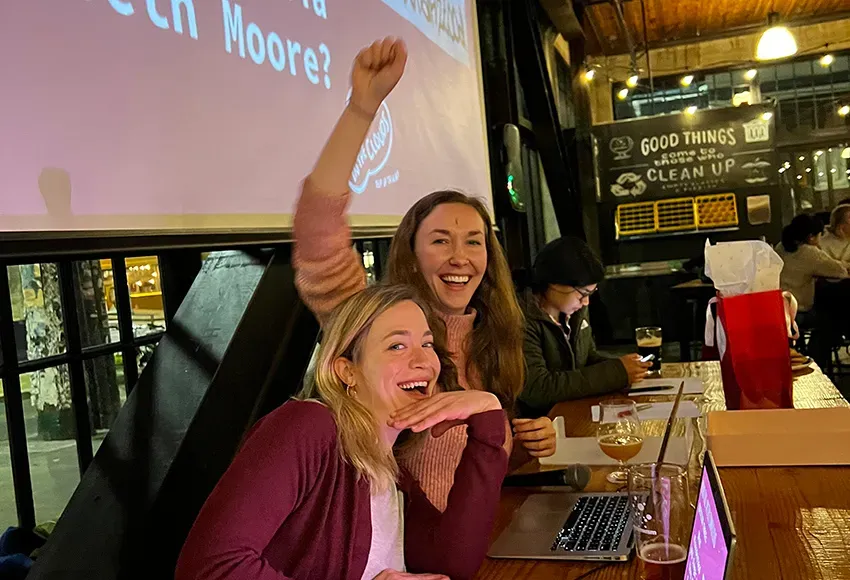After the iconic success of Jeopardy! star Amy Schneider, trivia seems more on everyone's minds than ever lately.
Two women from Seattle, Sally Neumann and Leah Caglio, are Jeopardy! champs and trivia buffs as well (from 2016 and 2021, respectively). They met in a University of Washington honors English seminar, when Caglio was working on a crossword in the back of class. Since then, they've developed a close friendship, and this past year, they decided to start their own trivia company, named "Head in the Clouds," to continue the fun.
The SGN got the chance to speak with them about shaping a company out of love of trivia and a desire to expand the categories of what is askable.
Editor's note: This interview has been edited for clarity and brevity.
Nick Rapp: On the subject of crosswords, one of my favorite activities with friends is doing the NYT crossword together – a sort of trivia. There's a special kind of group energy when working on logic puzzles and fun-fact activities. What do you think it is about trivia that brings people together?
Leah Caglio: I think about Captain Planet, where it's like "I bring heart!" and "I bring power!" Everyone is bringing their little superpowers to the team. And there's always a person when you're hosting trivia who's like "I'm that person that doesn't know anything except for one question," but with that one question, your team is gonna go wild, and so are you. That's what's great about it.
Sally Neumann: I also think it's an avenue for people who are more introverted, or intense, to be less socially nervous and have an opportunity to non-nervously interact – to share more of themselves in a group.
NR: With access to information widely available since the advent of the internet, it seems like everyone can learn everything about anything. Now it's almost more tough to have deep knowledge in a few subjects than it is to know a little bit about a lot. Do you think this makes it harder or easier to be good at trivia?
SN: I think, kind of, both. We talk about this all the time, how we feel like we're actively getting dumber. You know, COVID and our dusty, 30-year-old brains. You don't have to retain stuff as much anymore. It's usually a fun exercise, like a sport, but now it's like, "Ah, I forgot this dude's name, let me pull up my IMDb app." But second, it's easier, because at night, our fun activity is cruising Wikipedia and all the listicles and fun facts. I don't know... Do you think it makes it harder to write something that seems novel?

LC: That is one of the hardest things. When we're writing questions and there are gonna be Gen Z'ers in the audience, you kind of assume that you've gotta go heavy on internet stuff. But "internet stuff" is referring to all sorts of things in the greater body of knowledge. I think a lot of people that are attached to that internet economy of memes and stuff like that are learning stuff without really knowing it. It's a really cool part of trivia when they don't realize that some dumb meme they were looking at is actually the answer to a historical or deeper pop culture question.
NR: How did you decide to start Head in the Clouds?
LC: When I was studying for Jeopardy! I thought, "Man, I would love to host trivia. That would be really fun."
SN: And then we were at a restaurant and she [Leah] was like, "I would really love to start a trivia company," and I was like, "Wait, same, are you serious?" And she said, "Yeah."
LC: I never thought that starting a business would be a part of my life, but I was kind of like, "Why not?" [Trivia's] something that I really enjoy doing and people obviously love participating in. The timing was hilarious, because it was deep into COVID and on the one hand we had nothing to do and were afraid it would be a total flop, but on the other hand, it gave us a lot of time to lay good groundwork and develop a variety of questions and test out formats. So thanks, pandemic, I guess?
NR: Your trivia is split into general knowledge, audio rounds, and visual rounds. What do these categories look like?
LC: In the audio rounds, we play eight to ten tracks, and they'll have a theme, or be weird in a certain way. For example, we'll have a category called "Celestial Songs," so songs with "star, moon, or sun" in the title. Or, sometimes there are "eight-bit tunes," popular songs played in that screechy, chip-tune version. It's a really nice way to break up the rounds, so if you're just there tagging along and you're not a trivia person, it's a good way to break it up.
SN: When it's a space with really good audio, we'll play scenes from movies. But in the big venues, where the sound is weird, we'll just do songs. For the visual rounds, my favorite are where we do kind of like a visual puzzle. We'll put together certain images to assemble the title of a rom-com or something. I make them super intense. I'll be like, "This, minus this thing in parenthesis, plus this, times two," and it's super intimidating but very doable. And we like to make them very tongue-in-cheek.
NR: You mention on your website that trivia has historically been sort of exclusionary and focused on a narrow canon. What do you see as the most glaring omissions from the mainstream trivia world?
SN: You can't help but write from your perspective – where everybody starts is what they're interested in. And obviously part of that comes from what sociocultural place we're coming from. So, first of all, just having women write trivia at all is different. We're more inclined to write stuff about the "womanier things," so, classically, fine arts...
LC: A lot of things that are considered "trash" like reality TV, fashion, beauty... those are all facts and they're hundreds of years old at this point, so it's kind of crazy that we don't treat [something like] natural dyes used to make lipstick as a chemistry question. It's all chemistry, but just in different ways. I had a team that suggested menstrual periods as their category, so I wrote a whole category about them. There are so many angles to topics that would most of the time be a "no-no."
Another cool thing... about geography or international cultures is writing about them [in] a way that is not "from America." Instead of "America did this to this country," it's more like "Today is Pakistan's Independence Day."
SN: Our Thanksgiving questions were "White Failure, Indigenous Victory." They're never gonna be about, like, "the harmonious meal."
Register for Neumann and Caglio's latest events and read more about their company at https://www.headinthecloudstrivia.com/.


